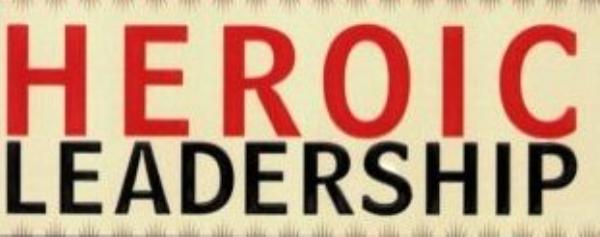What I had not expected was that the 10-week unit in Christianity and Town Planning would be a life-changing event and that Fr. Ron Darwen SJ had set me on a course that would affect the rest the rest of my life in all of its aspects. I began to see that ‘God is in all things’ and that, where He is missing, He is needed. By seeing God in others and by inserting Him where He is not, structures and processes change for the better. ‘God first’ is all that is needed in order to change the world.
This is a personal explanation as to why I found myself reading a book that is aimed at bankers and corporate business managers, but is also ‘doing the rounds’ amongst Jesuits in America. I suspect that they are just as ignorant of business leadership as I am… or are they?
Chris Lowney was a Jesuit for seven years when he discerned that his life’s path led in a different direction, but this was a period that, as can easily be seen from his book, filled Lowney with a deep respect and an abiding love for the Society of Jesus.
Heroic Leadership: Best Practices from a 450-year-old Company that Changed the World is an intriguing, beautifully-crafted book that captivates from the very start. It is full of insight into the business world, but with enormous love for, and understanding of, the Jesuits. Drawing from real-life examples of leaders such as Atilla the Hun and Machiavelli’s Prince, the travesty of true leadership is so obvious that one is left wondering why anybody could have missed the obvious: that leadership is found in the exercise of four unique values: self-awareness, ingenuity, love and heroism.
The entire book is concerned with demonstrating four principal Jesuit contributions to true leadership:
- We’re all leaders, and we’re leading all the time, well or poorly.
- Leadership springs from within. It’s about who I am as much as what I do.
- Leadership is not an act. It is my life, a way of living.
- I never complete the task of becoming a leader. It’s an ongoing process. (Emphases are the author’s.)
Lowney asks why it is that those who are in positions of authority in the vast range of human institutions are seen as leaders when their decisions only occupy 1% of their time and they themselves are only 1% of the workforce. Where are the other 99%? Does that mean that the entire remaining 99% of workers are merely followers and relegated to a position of inferiority? Who put the ‘leaders’ into their positions in the first place? Was it not those who taught them to read and write, educated them and inculcated the qualities that enabled them to take up their commanding positions? Was it not, then, the exercise of leadership by parents, teachers, siblings and so on that facilitated this progress? Does it not mean, then, that ‘leadership’ is something that is exercised by all of us all of the time? Does this not imply that, rather than a superior-inferior relationship, there is one of equality and fruitful cooperation that does not depend on achievement, but on merely being a human being?
Lowney takes each of the four values of self-awareness, ingenuity, love and heroism, examining them in some detail, drawing from the richness of Jesuit history, life and ethos. His role models for leadership are people whom he himself describes as ‘unlikely’. Benedetto de Goes, “never found the kingdom of Cathay. Nor did he find the hoped-for shortcut from India to China” for which he sought. Matteo Ricci, an Italian, ended up in China, where he took the Chinese language and culture deeply to heart. Christopher Clavius helped to develop the Gregorian Calendar that we still use today.
Here in Britain, we can think of such Jesuits as Saints Edmund Campion, Robert Southwell, Nicholas Owen and Blessed Robert Middleton, as also Robert Persons, John Gerard and William Weston. In the world’s eyes they might have been failures. Four of them were executed. Three spent a considerable amount of time in hiding and eventually had to escape to the Continent, but they and others like them, made it possible for the Church to survive the persecution of the Reformation. If these men did not lead by example, who did?
True leadership demands self-awareness, and so Lowney takes the reader through a beautiful journey via the Spiritual Exercises to the realisation that ‘the whole world becomes our house’ and to an understanding of the intrinsic value of each and every human being. Through love, leadership thus becomes ‘an uninterrupted life of heroic deeds’, even at great personal cost and risk-taking, simply because ‘that’s the way we do things’. Lowney uses the example of the suppression of the Jesuits as a result of their too-impressive success, pointing out that they were ‘nearly but not quite’ eliminated.
Heroic Leadership is a beautifully written, simple and affirming book with a solid base in real life, scholarship and understanding of who and what the individual can become. It is filled with a challenge to listen to and respect even those with whom we might not agree, because “leadership is not defined by the scale of the opportunity but by the quality of the response”. There are no quick fixes. Some of the world’s greatest leaders have only been recognised after their death. Lowney points out that, in our society today, we are all too eager for immediate answers and highly visible results… which reminds me of a line from the great Indian poet Tagore, ‘He who opens the flower does it so gently’.
Heroic Leadership is not a ‘warm, fuzzy’ piece of pop-psychology. Neither is it meant to be a ‘spiritual reading book’. In fact it is quite difficult to categorize, precisely because it touches ‘me’ personally, challenging ‘me’ to take a different look at the role and exercise of leadership in society today through a sincere, admiring look at a group of men who, for 450 years, have exercised leadership in virtually every aspect of society that anybody might care to consider. It is a book for those who are corporate managers and for those who are in acknowledged leadership positions in many other spheres. More importantly, it is a book for personal reflection for anybody and everybody, especially for those who are living and working with others…and does that not mean each of us?
Heroic Leadership might have been written to show how one group of men, the Society of Jesus, has had something to teach the world, but what the book actually does is to show, very effectively, how to live the Gospel more faithfully. It seems to me an excellent exercise in true leadership.
The reviewer, Sr Janet Fearns FMDM, is Communications Coordinator for the Pontifical Mission Societies
![]() Heroic Leadership at Loyola Press
Heroic Leadership at Loyola Press






